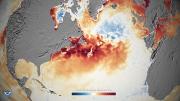Making Connections - a podcast by The University of Texas Marine Science Institute
from 2021-05-23T00:00

One of the adages of modern science is that if a butterfly in China flaps its wings, it might lead to a hurricane weeks later in the Atlantic Ocean. There’s no way to prove or disprove that idea. But there does seem to be some evidence of a connection going the other direction: Warmer water in the northwestern Atlantic may be one factor in creating heatwaves over China, Korea, and Japan.
Eastern Asia has undergone several deadly heatwaves in recent years. A month-long hot spell in 2018 broke a century-old record in Korea, with temperatures reaching 105 degrees.
Several factors combine to create the hot weather, including high pressure over the Himalayas and the Pacific Ocean, and warmer waters in the northern Pacific. But researchers have identified a link with the North Atlantic as well.
Earlier studies had already found some connections. Long-term changes in surface water temperatures in the North Atlantic and the northwestern Pacific seem to be linked, for example. And changes in the North Atlantic can influence Asian typhoons.
The recent research looked at 40 years of Asian climate records. Scientists compared those numbers to sea-surface temperatures in the northwestern Atlantic. They found a link. They report that warmer water in that part of the Atlantic can create a “wave” in the atmosphere. It connects with global circulation patterns. As it reaches eastern Asia, the wave helps make conditions hotter and dryer -- contributing to deadly heatwaves.
Further episodes of Science and the Sea podcast
Further podcasts by The University of Texas Marine Science Institute